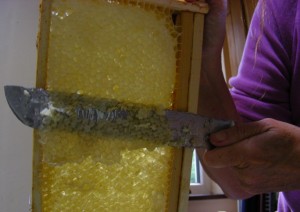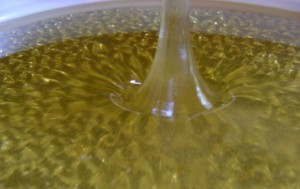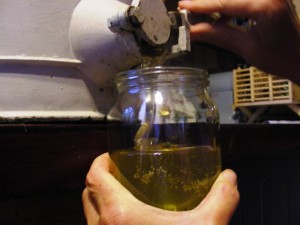Ask the wild bees what the Druids knew. – Fiona Macleod
 Lammas is a time of many harvests, not least the golden bounty of the bees. The hidden valleys of West Wales have long been havens for bee-keeping.
Lammas is a time of many harvests, not least the golden bounty of the bees. The hidden valleys of West Wales have long been havens for bee-keeping.
The first name that this island bore,
before it was taken or settled;
Myrddin’s Enclosure.
And after it was taken and settled,
the Island of Honey.
 We have our own three hives up by the pear trees, sheltered by the holly hedge. On sunny days our garden sounds like Yeats’ ‘bee-loud glade.’
We have our own three hives up by the pear trees, sheltered by the holly hedge. On sunny days our garden sounds like Yeats’ ‘bee-loud glade.’
On Sunday we collected the first honey of the year – the result of a miraculous alchemy in which bees turn the nectar of hundreds of flowers into sweet golden syrup.
In Scotland’s western isles, people once talked of ‘the secret knowledge of the bees,’ for these tiny creatures were thought to embody the ancient wisdom of the Druids.
So what did the Druids know? Bees have long been considered divine messengers from the gods. And until quite recently in the Highlands and Islands, people thought that, when in sleep, trance or death, the soul left the body in the form of a bee – a belief that has clear druidic origins. Druids were trained in the art of the ‘soul-flight,’ by which they could journey to the Otherworld for knowledge from the spirits. They would probably have endorsed the tenet beloved of the mystery schools of the Near East: Si sapis, sis apis! – If you would be wise, be a bee!
Perhaps they also carried forth the tradition of the Great Goddess, for bees, whose lives are organised entirely around a single queen, have been sacred to the Divine Feminine for thousands of years, in ancient civilizations from Babylon to Rome. Bees were revered for their ability to pollinate flowers and crops, increasing the abundance of the Earth. The cultivation of honey was regarded as a sacred charge carried out with great reverence and ritual for it was seen as a precious gift from the Mother herself.
 In the classical world, priestesses of many aspects of the Divine Feminine, including Rhea, Cybele and Demeter, were called ‘melissae’, which means ‘honey-bees’, for they served the Goddess as Queen Bee. At the Ephesian temple of Artemis, the melissae were accompanied by castrated priests who represented male bees or drones. Aphrodite’s shrine on Mount Eryx was shaped like a honeycomb, considered by the Pythagoreans to be a symbol of her qualities of love and harmony, because of its perfect hexagonal shape.
In the classical world, priestesses of many aspects of the Divine Feminine, including Rhea, Cybele and Demeter, were called ‘melissae’, which means ‘honey-bees’, for they served the Goddess as Queen Bee. At the Ephesian temple of Artemis, the melissae were accompanied by castrated priests who represented male bees or drones. Aphrodite’s shrine on Mount Eryx was shaped like a honeycomb, considered by the Pythagoreans to be a symbol of her qualities of love and harmony, because of its perfect hexagonal shape.
 Our honey bees were somnolent in the warmth of the mellow August sun, and did not protest when David removed the frames of honeycomb, heavy and bulging with honey, each cell meticulously capped and sealed with wax.
Our honey bees were somnolent in the warmth of the mellow August sun, and did not protest when David removed the frames of honeycomb, heavy and bulging with honey, each cell meticulously capped and sealed with wax.
In Wales the bee was said to have been brought by the old sow-goddess, Hen Wen (the Old White One) who dropped three grains of wheat and three bees in the county of Gwent, which has since produced the best wheat and the best honey in the land.
In the Welsh tale of Culhwch and Olwen, the young hero must perform many impossible tasks before he can win the hand of the giant’s daughter, Olwen White-Track. One of these is to gather ‘honey that is nine times sweeter than the honey of the virgin swarm, without scum or bees, to make bragget for the feast.’ Bragget is a drink made from honey and spiced ale.
 My job was to scrape the wax caps off the honeycomb to reveal the golden treasure within – a sticky business! Then David spun each frame in a cylindrical tank to extract the honey, and when it was full, we filtered it through a couple of sieves into a settling tank. The rich golden stream flowed out like a river.
My job was to scrape the wax caps off the honeycomb to reveal the golden treasure within – a sticky business! Then David spun each frame in a cylindrical tank to extract the honey, and when it was full, we filtered it through a couple of sieves into a settling tank. The rich golden stream flowed out like a river.
In early Ireland, the Bards sang of Land-under-Wave, the Otherworld country of the gods, where
‘Rivers pour forth a stream of honey
In the land of Manannán son of Lír.’
 This was the land where Celtic warriors hoped to live when they had passed from this world, where they could feast, carouse, and drink unlimited quantities of mead. Mead, made from fermented honey, was the drink of heroes and kings: the royal hall of Tara was called the ‘mead-circling house.’ But it was not only for the rich: An Irish hermit who lived in the woods celebrated his simple life among the swarms of bees, whom he called, ‘the little musicians of the world.’ Their symphonies entertained him while he drank his fill of honey-wine flavoured with hazel-nuts.
This was the land where Celtic warriors hoped to live when they had passed from this world, where they could feast, carouse, and drink unlimited quantities of mead. Mead, made from fermented honey, was the drink of heroes and kings: the royal hall of Tara was called the ‘mead-circling house.’ But it was not only for the rich: An Irish hermit who lived in the woods celebrated his simple life among the swarms of bees, whom he called, ‘the little musicians of the world.’ Their symphonies entertained him while he drank his fill of honey-wine flavoured with hazel-nuts.
 No mead for us, but jars of the sweet stuff for our breakfast toast – and hopefully, enough wax left over to make candles. This morning the waxy cappings were returned to the bees so that they could clean the honey off – food for them and clean wax for me. The rain came later this afternoon – a good time to bottle the filtered honey in glass jars.
No mead for us, but jars of the sweet stuff for our breakfast toast – and hopefully, enough wax left over to make candles. This morning the waxy cappings were returned to the bees so that they could clean the honey off – food for them and clean wax for me. The rain came later this afternoon – a good time to bottle the filtered honey in glass jars.
Bees were considered so important to early Irish society that there were special bee laws designed to protect them, called the ‘bech bretha.’ A 7th century holy woman called Gobnait, who founded a women’s community in southwest Ireland, had a close relationship with bees and used their honey for healing illnesses and treating wounds. She was said to be one of three sisters who had power over fire, and is clearly a Christianised version of the triple fire-goddess, Brighid, with whom she shares the same feast-day in early February.
When a band of thieves attempted to steal the community cattle, Gobnait let loose a swarm of bees on the rustlers and sent them fleeing in terror. At her shrine in Ballyvourney, Co. Cork, a statue depicts her standing on top of a hive, surrounded by bees.
Nowadays the bee population of North America and Europe is in serious decline, which is a disaster in the making for all our major crops which are dependent upon bees to pollinate them. Scientists are unable to pinpoint the reason, but suspects include the increase of commercial agriculture with its use of pesticides and destruction of wild plants and flowers for the bees’ forage. Also implicated are the mass transportation of colonies for commercial purposes, which creates stress for the bees and spreads disease. In fact, bees are an indicator species for the health of Mother Earth, and they are definitely giving us a dire warning about the way we are treating her.
To honor the Earth by giving back to the bees, you could join the many individuals and families who are taking up beekeeping in response to the current crisis. Or find some other ways to help, for instance:
- Leave an area of your garden wild so that plants can flourish for the benefit of the bees. In Scotland, this was called the ‘gudeman’s croft,’ the plot of land reserved for creatures of the wild, which included the faeries, or “good folk.”
- Create a wildflower meadow, or exchange formal flower beds and lawns for a profusion of flower varieties, especially early and late bloomers.
- Support small beekeepers by buying local honey and bee products such as beeswax candles and salves.
- Buy organic vegetables and fruit that have been raised without synthetic fertilizers and pesticides and support organic farming in your area.








I enjoyed this post, Mara. Interesting bee-lore and good to hear that you are bee-keeping. Enjoy your morning toast and honey!
I start my early morning with your blessing on the hone and the blessing on the bees in my mind. I enjoyed the write up and the photos. Thank you.
Anita
Thanks, Hilaire and Anita – If you’re down my way, pop in and I’ll share some with you!
Talking of sharing, I did leave a little bowl of honey out on the back doorstep for the faeries last night . . . they appreciated it too.
Thank you Mara. I knew of the melissae at the Temple of Artemis in Ephesus but did not know anything of the Druid and Celtic relationship with bees. Beautiful. And David looks smashing in his Beekeeper’s suit. 🙂
Blessings of the harvest to you!
Melissa Black
A wonderful writing, this morning in our weekly group practice, after reading your post, a bee came into the room circling our altar. Couldnt avoid smiling and thanking !!
Thanks for your comments, Melissa and Hector!
I’ll tell David of his sartorial success as a beekeeper!
wonderful and informative blog… great fun to read, thanks for putting this up!
such earthy soulful living evoked through your writing, and photos. so good to learn more of the bees, and of the druid traditions. thank u mara. blessed bee.
p.s. “astro-dance”… januar
Thank you, Januar. I feel very blessed to live in West Wales where the Green World is so alive!
Very interesting to read of your bee-keeping activities. Latest thinking is that bees are adversely affected by Diesel fumes, so the decline in the bee population unsurprising given our reliance on heavy goods vehicles, public transport, Diesel fuelled tractors, etc. I say ‘Bring back the heavy horses!’
I’m not sure what the “heavy horses” would have to say about that, but it would certainly be good for all of us, not just bees, to reduce diesel fumes. Mobile phone masts have also been indicated as causes for colony collapse, due to them interfering with the bees’ navigational system. Glad I don’t have a signal down here in my valley!
Did you know that in the Nordic tradition, bees are sacred to Freyr, brother of Freyja, and a deity of the fertility of nature as well as the Lord of Ljossalfheim, the realm of the light-elves? All true. In fact, Freyr is said to have two servants, Byggvir (barley) and Beyla (bee).
PS: Another animal sacred to both Freyr and Freyja is the swine. Gullinbursti (“golden bristles”) is the name of Freyr’s boar, and Hildisvini (“battle pig”) is the name of the one Freyja occasionally rides.
Funny, how these things come together – bees, wheat, swine. How interesting.
Hi TLH – Thank you for interesting information. Certainly some interesting confluences there . . .which can often be detected in Celtic myth.
Hi Mara! I own your book and absolutely love it (since it is very true to the ancient Celtic traditions I learned in my college Celtic Studies classes ;)), and I just happened to (happily) stumble upon your blog whilst looking for Celtic blessings for bees (those wonderful little cows with wings :D). I’ll be looking for my first swarm soon and I was hoping to find a nice blessing of sorts I can say over them. Anyways, I’ll be keeping an eye out for new posts. Thanks for the info!
-Jenna
I firmly believe Bees are messengers from somewhere. I have found in my life anytime I see bees repeatedly in a short amount of time it means caution or danger…like a warning. When my uncle suddenly had a massive heart attack and died at a very young age I had an enourmous swarm of bees come to my house a couple days before. I was astonished at them and then a couple days later I got the call about my uncle living 2 hours away was dying. When I moved to a new house in country I was out exploring in the forest and came upon a hive in the ground, nearly stepped on it. No harm to me…walked all the way home unstung but found out about a week later after seeing tracks on drive and talking to neighbor that they shot a bear that was crossing through the property and had been for awhile. I was the last to know and was in danger but thanks to the bees I didn’t go out there again and was saved. During my bankruptcy I moved states and filed but the trustee didnot read up on the laws for my old state which we initiated the filing and she started hassling us about hiding funds etc. On the way to her office and all the way home I kept seeing bee related things like a fresh honey bee stand, a bee farm, bees on bill boards it made me uneasy so I called my attorney when I got home and turns out after he investigated things the trustee was legally overstepping her boundaries and trying to illegaly stake claim on my exempt items. Do to the bees I called attorney and he stopped trustee and informed her of my old states laws which coincidentally she had not known as she admitted not reading my file thoroughly. I could have lost my bankruptcy case. I will always hold bees in high regard. I do not know why they have decided to help me but I will not question it. They keep me safe.
What an amazing story! You are certainly blessed to be befriended by tese wise bee-ings!